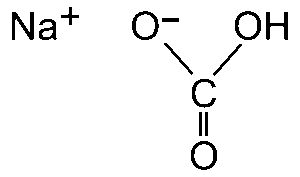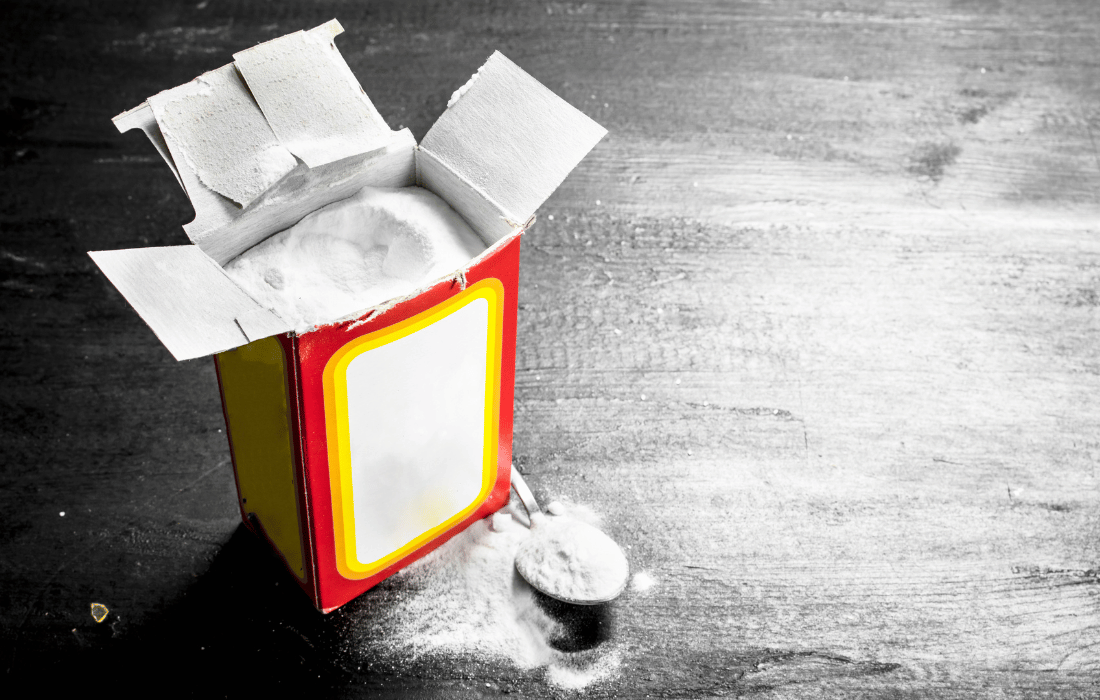Baking soda: it’s the unassuming little box sitting in your fridge absorbing odors, cleaning your bathtub, and, oddly enough, offering secret performance boosts for your workouts.
If that sentence made you raise an eyebrow, you’re not alone. Baking soda, or sodium bicarbonate, has been quietly flexing in the world of sports science for decades — yet most gym-goers are still too busy choking down neon-colored pre-workout powders to notice.
But let’s change that today. Let’s give credit where credit’s due — to the humble, gritty powder that might just take your training to the next level.
What Is Baking Soda, aka Sodium Bicarbonate?
 Before we start snorting lines of Arm & Hammer (please don’t), let’s get clear on what baking soda is.
Before we start snorting lines of Arm & Hammer (please don’t), let’s get clear on what baking soda is.
Chemically known as sodium bicarbonate (NaHCO₃), it’s a naturally occurring compound that’s mildly alkaline. It reacts with acids to produce carbon dioxide — that’s why it makes your pancakes fluffy and your fourth-grade science volcano erupt.
But inside the human body, that same reaction is far more useful than fluffier baked goods.
When your muscles work hard — lifting, sprinting, or cranking out burpees, you immediately regret, they produce lactic acid. That buildup lowers the pH of your muscles, making them more acidic and giving you that painful “burn.”
This drop in pH, called exercise-induced metabolic acidosis, is one of the key reasons why muscles fatigue.
Baking soda acts like a buffer.
By increasing the amount of bicarbonate in your blood, sodium bicarbonate helps neutralize the acid produced during high-intensity exercise, allowing you to push harder, longer.
Translation: it can directly raise the ceiling on your pain tolerance.
How Baking Soda Enhances Athletic Performance
You might be wondering exactly how this kitchen staple can turbocharge your workouts. Let’s dive into the specific ways baking soda can boost your athletic capabilities.
1. Buffers Blood Acidity During Intense Exercise
When researchers talk about baking soda’s athletic superpowers, they’re mainly referring to its role as an extracellular buffer.
Meaning: it hangs out outside your cells, dealing with the chaos that exercise creates.
In high-intensity exercise, hydrogen ions (H⁺) accumulate rapidly, contributing to that burning sensation. Baking soda soaks up those ions, keeping the muscle environment less acidic and delaying fatigue.
In short, it lets you stay in the fight longer. Whether you’re sprinting, lifting heavy, or defending your pride during an intense Jiu-Jitsu roll, baking soda buys you a few more precious moments of peak performance.
2. Improves Power Output and Sprint Capacity
Research indicates that sodium bicarbonate supplementation can enhance performance in high-intensity, short-duration exercises. For instance, an umbrella review published in 2021 concluded that sodium bicarbonate supplementation acutely enhances peak anaerobic power, anaerobic capacity, and performance in endurance events lasting approximately 45 seconds to 8 minutes, including activities like sprinting and high-intensity cycling.
Additionally, a study published in 2014 found that sodium bicarbonate improved high-intensity cycling capacity, particularly when participants who experienced gastrointestinal discomfort were excluded from the analysis.
These findings suggest that, when properly administered, baking soda can serve as an effective ergogenic aid for athletes engaged in high-intensity, short-duration activities.
3. Helps Recovery Between Sets
Interestingly, baking soda doesn’t just help during all-out efforts; it can help you recover faster between sets.
By buffering the metabolic waste faster, it helps clear the acidic byproducts that can otherwise linger and sabotage your next round of lifts or intervals.
Some studies even suggest that athletes who supplemented with baking soda were able to maintain performance across multiple bouts of exercise compared to those who didn’t.
Think of it like having your personal janitor inside your bloodstream — constantly cleaning up the mess so you can stay sharp.
How to Take Baking Soda for Workout Enhancement
Now that you’re sold on baking soda’s potential, let’s explore how to safely and effectively incorporate it into your training regimen.
The Classic Dosing Strategy
The general guideline for sodium bicarbonate supplementation is:
0.2 to 0.3 grams per kilogram of body weight, taken about 60–90 minutes before exercise.
Example:
180-pound guy (about 82 kg)
0.3 x 82 = ~25 grams of baking soda
25 grams = approximately 5 teaspoons.
Which sounds innocent — until your stomach has opinions about it.
The Ugly Side: GI Distress
Here’s the downside:
Taking a big whack of baking soda all at once can cause gastrointestinal distress — think bloating, cramping, urgent dashes to the bathroom, and questioning all your life choices.
It’s a classic case of great power, great responsibility.
To minimize these effects:
Split the dose: Take smaller amounts over the course of an hour leading up to your workout.
Capsules: Some athletes use baking soda capsules to bypass the nasty taste and stomach irritation.
Chase with a carb-based drink: Taking it with carbs (like a banana or small smoothie) may improve absorption and reduce GI upset.
“Microdosing” strategy: Some protocols suggest smaller daily doses (~0.1 g/kg) for 5-7 days before an event instead of a single giant dose.
Pro Tip: Test it on a training day, not competition day. Unless you enjoy athletic diarrhea.
Who Should Consider Using Baking Soda?
Baking soda isn’t for everyone, but for certain types of athletes, it’s a game-changer:
Sprinters: 400m, 800m runners, cyclists, swimmers
Combat athletes: Wrestlers, boxers, MMA fighters during high-intensity bouts
CrossFitters: High-rep, high-intensity events
Strength athletes: Powerlifters doing multiple heavy sets
HIIT enthusiasts: Anyone doing repeated sprints or high-volume circuits
Essentially, if your training style involves repeated high-intensity efforts where acid buildup normally shuts you down, baking soda is your new best friend.
Potential Risks and Side Effects
Of course, baking soda isn’t a miracle cure without downsides:
GI issues (the most common one)
Sodium overload: High doses mean more sodium intake — something to watch if you have hypertension or are sensitive to salt.
Alkalosis: In rare cases, too much bicarbonate can cause metabolic alkalosis — a condition where the blood becomes too alkaline, leading to symptoms like nausea, confusion, and muscle twitching. (But you’d have to seriously overdo it.)
Important: Always test your tolerance during practice, and consult a professional if you have underlying health conditions.
Baking Soda vs. Other Buffers: How Does It Stack Up?
There are other “buffers” out there, like beta-alanine, which works inside your muscle cells by boosting carnosine levels.
Baking soda works outside the muscle cells, while beta-alanine works inside.
Many athletes use both for a one-two punch against fatigue.
Some differences:
| Property | Baking Soda | Beta-Alanine |
|---|---|---|
| Acts where? | In the blood (extracellular buffer) | Inside muscle cells (intracellular buffer) |
| Time to Effect | Immediate (1-2 hours) | Chronic (weeks to months) |
| Best for | Single-day performance boost | Long-term training adaptation |
| Side Effects | GI distress, sodium load | Tingling (paresthesia) |
In other words, baking soda is your rocket fuel for today’s workout, while beta-alanine is a savings account for future performance.
Practical Tips: How to Add Baking Soda to Your Training
If you’re ready to channel your inner mad scientist and play with baking soda, here’s the smart way to do it:
Start Small: Try 0.2g/kg first and see how your body responds.
Hydrate Well: Baking soda can pull water into the intestines — make sure you’re well hydrated before and after.
Time it Right: Take it 60–90 minutes before intense exercise.
Combine Wisely: Pair it with carbs for better absorption and less stomach drama.
Experiment on Training Days: Never try anything new on race or competition day.
Is Baking Soda a Performance Hack Worth Trying?
Absolutely — if you respect it.
Baking soda is a powerful, legal, dirt-cheap ergogenic aid hiding in plain sight. It’s not as sexy as a $70 pre-workout supplement with a neon wolf howling at a lightning storm on the label, but it works — and it’s backed by decades of serious research.
If you can manage the GI distress, it could help you push harder, recover faster, and stretch the limits of what you thought was possible in your workouts.
And hey, worst case scenario? You can still use it to make your kitchen sink sparkle.








